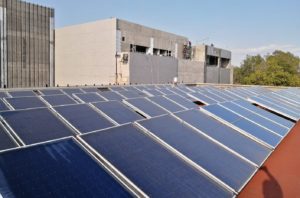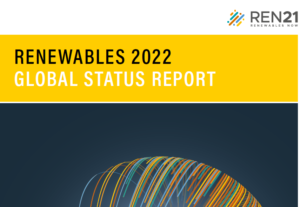“Together with ABB Robotics we can speed up the roll-out”
July 13, 2021The Swedish company Absolicon Solar Collector has joined forces with ABB Robotics to sell complete automated production lines for parabolic trough collectors throughout the world. The company has so far signed 13 letters of interest with investors on various continents. The idea is to reduce technology costs by producing collectors locally in countries with high irradiation potential. Parallel to this, Absolicon is negotiating with big food and beverage chains about the use of solar heat to reduce their carbon footprint. We talked about this business model with Managing Director Joakim Byström, who received the EON Swedish E-Prize 2020 in the category Renewable Energy in November 2020 (see photo). Absolicon is one of the five stock market listed solar tech companies analysed by Öko-Invest.
Photo: Absolicon.
You have recently signed a joint sales agreement with the robotic manufacturer ABB. Which objectives are you following with this cooperation?
Byström: We need strong partners to accelerate the transition away from oil and gas. We are now in discussions with more than 20 multinational corporations such as food and beverage chains to investigate how we can help them switch from oil and gas to solar thermal. We have shown that local mass production of solar concentrators can outcompete oil and gas. With ABB’s commitment to develop, market and sell our robotized production lines globally, we can speed up the roll-out process.
Who has the lead in the sales arrangements: ABB or Absolicon?
Byström: Absolicon still has the lead in developing local solar thermal markets by motivating multinationals to invest in solar concentrating technology. The increased demand will pay off investments in collector production lines. It is good to have ABB sales managers literally on our side of the table during the negotiations with potential clients for these lines. ABB will deliver the robot cells and provide local service. In this respect, our new partner profits from its global presence in around 100 countries.
How did you manage to identify all these potential investors for your collector production line?
Byström: We now have potential purchasers in countries around the world – including Spain, Turkey, Ghana, India, Ecuador, Mongolia, Peru, Cyprus, Kenya and South Africa. This year, we have already signed three more agreements. First with Planet Soar in France and h2t consultores in Uruguay in January and then with Citrus in Mexico in February. There are many companies looking for opportunities in the renewable sector and we have a process that lets interested parties learn step by step whether industrial solar heat is a business opportunity they can make money with.
How long does it usually take from signing an agreement to the purchase of the line?
Byström: We are seeing 2 to 3 years now, but we are still in an early phase. With the help of ABB and a few of the multinationals we are in discussions with, this process can be substantially streamlined in the future. The big question is how fast big consumer goods brands want to green their heat demand.
We are working from two directions – Absolicon is talking with multinationals like AB Inbev that have 200 breweries around the world and the production line investors are talking to local industries. Together, these two streams of marketing create the required volumes to start the local production. One important step is to install a local pilot plant so that large heat consumers can “touch and feel” the new concentrator technology. We are building five pilot installations right now in different countries. Each pilot is a turnkey 3 MW installation producing steam or pressurized hot water.
Is interest for solar heat increasing among multinationals?
Byström: Indeed, we have seen a change of perspectives in the past year. It is not a game anymore for big brands, asking for quotes and fooling around. They have an urgent need to decarbonize. The big textile companies like H&M, for example, have made impressive commitments to reduce their carbon footprint by 2030. Now they are looking to help their suppliers to start the decarbonization journey. Consequently we have performed around 10 feasibility studies for textile companies in India and Ethiopia.
The automated production of the parabolic trough collector T160 works with only a handful of components.
Photo: Absolicon
Do you see any competition from other energy sources?
Byström: Two years ago, biomass was the main alternative for many multinationals. They thought they could easily switch from oil and gas to burning wood chips. Not anymore. Biomass is off the table. It is not politically acceptable any longer to make a large increase in the extraction of wood from forests. PV is important for electricity to power machines and offices of course, but for process heat, solar thermal is always cheaper than electrification.
Reducing the cost of solar heat is one of the key factors for long-term success in this sector. What aims do you want to achieve regarding this issue?
Byström: By providing mass produced components of high quality and building the concentrators locally we see substantial cost reductions. We are currently offering turnkey installations for around 200 EUR/m2 for larger fields with a minimum solar thermal capacity of 15 MW. In combination with good financing of the solar fields, this will make solar heat a lot cheaper than oil and gas in most markets. Large volumes are the key to lower costs. By getting commitments for substantial volumes of solar concentrators from multinational companies in several countries in parallel, we can achieve further cost reductions.
Organizations mentioned in this article:


